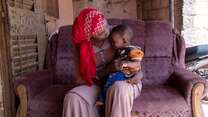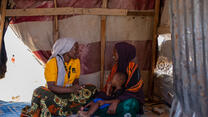The war in Syria has raged on for six years, causing a staggering 11 million people to flee for their lives — the largest refugee crisis of our time. More than six million are displaced inside the country, and nearly five million have fled to nearby countries in search of safety. But many, including the 1.7 million Syrians registered in neighbouring Jordan and Lebanon, are living in precarious circumstances.
On 4 February 2016, the international community came together at the Supporting Syria and the Region conference in London, hosted by the Governments of the United Kingdom, Germany, Kuwait, Norway and the United Nations (UN) to bring more resources and assistance to meet the immediate and longer-term needs of those affected by the crisis. Participants of the conference stepped up in significant ways: donors pledged US$12 billion in new financing until 2020 plus US$40 million in new loans, and the World Bank negotiated ground-breaking concessional financing agreements with Jordan, Lebanon and Turkey. The conference outcomes and pledges were reflected in three distinct agreements with Jordan, Lebanon and Turkey known as ‘compacts’.
The one year anniversary is an important moment to reflect on progress against these compact agreements, and determine how to ensure better outcomes for refugees and host communities in the immediate and longer-term. This report evaluates progress against the Jordan Compact to date and outlines the lessons the International Rescue Committee (IRC) has learned through its work on refugee livelihoods, including its Million Jobs Challenge initiative. Based on these findings, we aim to inform governments, humanitarian and development stakeholders on the challenges still facing Syrian refugees in Jordan who are trying to find work.
We commend the Jordan Compact partners for bringing new financing and making strides towards necessary policy changes; however, progress towards improving economic opportunities for refugees and vulnerable Jordanians has been slow and uneven. The Compact is a new type of partnership which perhaps explains some of this. It also reflects, in part, the economic, social and structural challenges in the Jordanian context, such as high unemployment rates and a poor investment climate, as well as revealing weaknesses in the Compact’s design and management.
At the same time, there are opportunities to improve the Compact and better align efforts with the facts on the ground, including refugees’ experiences with the work permit and business formalisation processes, and the specific vulnerabilities that women face in search of safe and decent work. We support the overall approach of the Compact because it has the potential to bring real improvement to the lives of refugees in Jordan however, it is important to be clear that this is not a substitute for donor countries meeting their obligations to host refugees within their own borders.
Recommendations
Donor governments must step up their action on sharing responsibility for hosting refugees. Jordan hosts 87.45 refugees for every 1,000 inhabitants, while the United Kingdom hosts just 1.90 per 1,000, Germany hosts 3.92 per 1,000, and Kuwait hosts 0.19 per 1,000 and Norway hosts 9.67 per 1,000.
The IRC strongly supports the Jordan Compact because, if properly and faithfully implemented, it has the potential to bring real improvement for refugees in Jordan. However, additional financial aid and progress on improving lives and livelihoods in Jordan – or indeed anywhere else – is not a substitute for donor countries meeting their obligations to host refugees within their own borders.
In the midst of the global protracted displacement crisis, the Supporting Syria and the Region Conference provided an opportunity to pledge action for those affected by the Syrian war through new aid, and by opening up access to jobs for refugees. The Jordan Compact provides an innovative and meaningful way for the Government of Jordan and development and humanitarian actors to generate an agreed pathway for job creation. However, one year on, a close examination of progress so far reveals implementation has not matched its potential. There is much at stake and, as the crisis draws into its seventh year, it is imperative the opportunity is not squandered.
Compact partners including the Government of Jordan and development and humanitarian actors must learn from experience to date and reform their way of doing business to deliver fully on their commitments to refugees and Jordanians. To ensure the greatest impact, they should review progress against the Compact annually and make adjustments, starting now by implementing the below recommendations. A “test and learn approach” should be adopted to increasing formal employment, implementing innovative ideas at small scale, rigorously evaluating their impact, and scaling up the interventions that work while abandoning those do not. Financing should support this approach; donors must ensure that funding for pilots and evaluations is available throughout the lifecycle of the Compact.
The IRC recommends that the following actions are taken in 2017—
To overcome policy barriers faced by refugees, the Government of Jordan should:
- Implement a Protection Guarantee to help existing rights become a lived reality, by ensuring refugees have safe, accessible and affordable pathways to obtain Ministry of Interior documentation that allows freedom of movement, and provides a credible basis for formal recourse in the event of exploitation, harassment, or abuse.
- Immediately delink work permits from one job/employer and expand the number of sectors and professions open to refugees, en route to a general right to work for refugees.
- Rapidly simplify, incentivise and promote business formalisation processes, especially by improving availability of credit information and access to credit.
To improve the design and implementation of the Jordan Compact, donors, in conjunction with the Government of Jordan, should:
- Support self-employment opportunities by:
- Introducing a Business Booster Package – including cash grant programmes – to stimulate the creation of new enterprises and promote the growth of existing ones; and
- Exploring opportunities in the gig economy and other freelance work that allow for flexible hours and choice.
- Expand new trade access policies to qualifying firms outside SEZs that agree to meet the current requirement of employing at least 15 per cent of refugees by year one and 20 per cent by year two.
- Favour investment in SEZs that are most proximate to refugee and host residential areas to maximise linkages with the local economy and in sectors such as technology, that offer higher quality job opportunities.
- Implement gender-specific employment solutions that reflect the unique constraints faced by women in accessing employment, and enhance support for female labour force participation so that the number of work permits held by women grows from four per cent to at least 15 per cent by the end of 2017.
- Provide refugees with the material support and information needed to access employment opportunities, such as subsidised transportation and childcare; for example, ensure that SEZs have childcare on site, provide bus passes or free travel for employees, and create a digital portal for employment information.
To improve the management of the Jordan Compact, partners should:
- Consult refugees to better understand and address their unique constraints and needs, and then design interventions that can help them overcome those barriers.
- Develop an accountability mechanism with an annual review and adjustment process for key actors including Government of Jordan ministries, the World Bank, donor governments and UN agencies, setting out key tasks and measures for implementation for each Compact promise and dates for milestones to be met.


